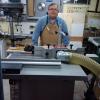Hi everyone,
I have been posting a lot recently about very entry level questions as I am trying to build my first shop and get into woodworking the right way. So I really appreciate everyone's input. It has been very valuable.
Over the weekend I bought a used unisaw model 36-955 which I think is from 2000. It has a biesemeyer fence and extension table. I also bought a 6" delta jointer, model 37-220.
My question is what routine maintenance and care should I do on these machines? They are currently stored in a heated garage. However, I only turn the heat on when I am going into the garage to work and do not keep it on all the time. I put a light coat of WD40 over all the cast iron surfaces to prevent moisture and rusting. Anything else I should do?
What about monthly/yearly maintenance? Or as needed maintenance? Any grease, wax, PMs I should perform?
Thanks again!




 Reply With Quote
Reply With Quote


